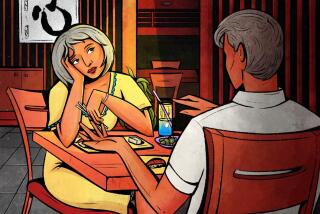PRIVATE FACES, PUBLIC SPACES : In the Land of Equals, a Prince of a Gentleman
- Share via
A very old man, going blind and nearly deaf, shuffles into the Felipe de Neve Library on Rampart Boulevard. Outside, no one looks at him; he is invisible, already a ghost before his passing.
It takes him an hour and a half, and three buses, to get here. He comes every Saturday to read to the children--the children and grandchildren he never had. It is among life’s small jokes that the library calls him a visiting grandparent, that he reads fairy tales and make-believe, this simple man with the large, plain face above the bent, 85-year-old body.
When he reads, there is sweetness in his face. He leans forward to the young children, whose light voices he strains to hear. And yet he touches them, this rough and kindly old man. He reads in Spanish, a language he can hardly pronounce; he reads in English, fairy tales from his childhood in dark, sooty tenements in the East End of London, before the Great War.
His grandfather was a goatherd; his father, a cabinetmaker, as was he. He worked through the Depression when others went hungry; he worked through war when others went to their death. The good son, the youngest son, the one who looked after his widowed mother and didn’t marry.
This forthright man with the large ears, the fat, stubby hands, is unsentimental, down-to-earth--as though his whole life has been flat, routine. He talks of himself as “no one special, no one important, a man, in a little way, of business.” And yet he has known as great a love as any of the young men who pass him blindly on his West Hollywood street.
Above all, he has loved the United States. “I feel I started to live when I came here.” He came first in 1947, a year of bitter cold and shortages in London. He went back because his mother was ill, his sister needed him. He moved here finally in 1959. The warmth and light gave him a new life. In London he was Mick Marlow, tradesman, a Cockney, respectful to his betters. In Los Angeles, he became Michael Marlow, antique restorer, formerly an Englishman.
In London, he would never have escaped the small, dull respectability of his life; the accent, the clothes, the workman’s hands were sentences all. America made him free: free to take his chair onto the sand, to drive with pride his Buick Skylark--the car he gave up two years ago as his eyes began the merciless betrayal of age.
And the States gave him the chance to live as a gentleman with the widow he loved and married so late in life. They traveled to Europe, across the world and America, were received respectfully in fine hotels, where once he knew snubs in English seaside boarding houses--the tiny, deadening snobberies of the old order.
On his living room wall, above his beautiful handmade furniture, hang the photographs of his wife: Freda, a grocer’s daughter, a small, neat, handsome woman. He met her first in 1931 when he was 25. He married her nearly 30 years later. How secret must the dearness of his courting have been, kept away from the hard eyes of his mother. “My mother always said: ‘You don’t have to love a girl to marry her.’ My mother used to say she made me too comfortable, and I ought to get married and make some girl happy. . . . My mother used to say: ‘Love is baloney.’ ” The whiff of smothering across half a century.
The sense of not mattering, of being invisible--was it always there? Even now, he remembers being “the only one in the family who couldn’t dance.” He says: “If a person is good-natured, even brothers and sisters take advantage of you.”
Freda made it better: “Freda was a wonderful listener. She could suffer for someone more than they could suffer themselves.” When she died in her sleep, he was bereft; his world closed again. “I’ve always thought I had a dull, uninteresting life. I didn’t do any great things. The only wonderful thing I did was to marry Freda.”
She died five years ago. “A man should wake up and thank God a million times every morning that his wife is there.” He lives alone, hard of hearing, sight withdrawing--and has learned to take buses in the darkness without fear. He has also learned to entertain small children with stories, to visit old people in nursing homes, to deliver Meals on Wheels and to teach illiterates to read.
Michael Marlow: gentleman.
More to Read
Sign up for The Wild
We’ll help you find the best places to hike, bike and run, as well as the perfect silent spots for meditation and yoga.
You may occasionally receive promotional content from the Los Angeles Times.




